|
Note: In AA there are two traditions regarding anonymity: no use of last names and pictures of those within the program. These traditions are observed in this interview. Joe M. is a very unique man. He has battled poverty, alcoholism, cancer, and heart disease. During his life, he has not only taken on these problems but has turned them into a blessing for himself and many others. Hundreds of people have benefited from knowing and being helped by Joe. I hope that through this interview others will be able to take comfort and strength from this most singular man. His caring and wisdom have blessed my life during the nearly two decades that I've known him; may Joe be a blessing to you also. Al. Joe, tell me how someone from West Virginia wound up in Northwest Indiana. Joe: I was born in Stuebenville, OH in 1937 and raised in Weirton, WV-a town so small that we didn't have a hospital. We had to go across the river to be born. My folks had come from Western Pennsylvania. My dad was a cop in Clairton, PA. He was fired from the police force because of his drinking. He wound up at Weirton Steel during the depression. A great-uncle of mine got everyone in the family a job at that steel mill. Then the war came along. My mother went to work in the mill, my dad was still a mill cop. He also was still drinking heavily. My sister, Pat, at nine years old took care of me. Al. After she got you into your teens, where did you go to high school? Joe: I went to high school at Stuebenville Catholic and graduated in 1955. I went to work at Weirton Steel that year. It wasn't long before I was laid off, and it wasn't long before I went back to work again. But in 1957, of the 13,000 workers 3000 hit the street all on the same day. I went back to work in the fall of '58. I was married to my first wife in 1960 and told her that I was sick of getting laid off. At that time, the mill was starting a new plant in Indiana. In May of '61 I went to work at Midwest Steel. I retired on July 1, 1997 after forty-two years. I started on the tin shear line. I was a piler. Transferred out of there as a shearman in '70 and went into maintenance and worked in the tractor shop. I worked hard and I drank hard-just like my dad. Al. When did you quit drinking? Joe: It wasn't until 1977. Several years later, I started to work with people with alcohol and drug problems. From that small start grew the EAP program at Midwest.
Al. How do you account for this? Joe: My prostate doctor is the head specialist at the University of Chicago Hospital. His name is Dr. Charles Brendler. He is great and a very fine man. If anyone has a problem with his prostate, call Dr. Brendler. He has gotten me to where I am today. I also have prayed a lot and had a lot of people praying over me. When it comes to praying, I'm ecumenical. I have had Catholics, black Baptists, and even white Presbyterians praying for me. And because of all this, I'm feeling wonderful. Without God in your life, you don't have much of chance. I really believe that. They woke me up on that operating table to tell me that I had inoperable cancer, and that it had spread into my lymph system. Then they put me out again until I woke up in the recovery room. While I waited to be moved to my room, I sent for my rosary beads to keep from going completely nuts. It is amazing how when you are in desperate need, you go back to things in which you found comfort in your childhood. Al. What is your actual prognosis? Joe: My doctor said that I have five to ten years. That prognosis made up my mind about retiring. It was sad, but it was also great. I had more seniority than any other employee. They said of me that I was as old as the dirt around the mill. Al. What have you been doing since your retirement? Joe: Working. I've been working on my motor home, this house, and my cottage on Lake Erie. I don't know how I found time to do my job at the mill. I have no leisure time on my hands. It's frustrating. Al. Talk to me about your recovery and AA. Joe: My dad was in AA for twenty-four years before he died. It took me awhile to get into the program because I knew that AA worked. I should have been in AA five years before I did. I think that if someone had confronted me, I would have started sooner. The yardstick that I used with my alcoholism was whether I could go to work: if I could go to work, I wasn't unmanageable. I went to work in a blackout. I would leave the mill and couldn't find my car. A lot of days, I didn't belong at work. During July of '77, I had been drinking heavily. One morning I got up but couldn't go to work without the help of a drink. The result was that I got stoned. It was then that I called AA. There I stood outside the door of my house waiting for a couple guys who told me that they would pick me up to take me to the meeting. Had I had their phone number, I would have called them to tell them not to come. I needed a drink more than I needed an AA meeting. My little girl asked my ex-wife "What's wrong with Daddy?" She said, "He needs to change, but he doesn't want to change."
Joe: Don't drink. Go to meetings. Read the Big Book. And finally, remember, "Good things happen to drunks that don't drink." Al. Joe, I'm one of those people who want the source book for all your pithy sayings. Joe: You can't have it. Al. Then give me another quote. Joe: I don't recall where I heard this. I may have made it up. I don't recall, but it is about thoughts, words, and actions. "Watch what you say in a crowd. Watch how you act at home. And watch what you think when you are alone." Al. How about another pearl of wisdom? Joe: Insanity is doing the same thing over and over again expecting different results. This applies to everyone, not just alcoholics-this is about life. Al. You have bitten the bullet several times when death could have taken you. Some time in the future, you won't be able to dodge death. What would you like to have as your epitaph? Joe: "He was a good AA." Al. Anything else? Joe: Nope. That covers everything. Al. Tell me about your family. Joe: Together, Barb and I have six children, two girls and four boys. We also have eight grandkids. And I will tell you what, if I knew that grandfathering was so good, I would have done it before I had any kids. I would have done it when I was eighteen also. You can spoil them, raise heck, and then send them home. Al. When you have the time to read, what do you like the most? Joe: The books of Louie L'Amour. I use to read one a night. I loved his stuff. He had an imagination. He could put you right where he was talking about. On one of my trips, I went to The Green River Rendezvous-but I went in July. There wasn't even a river there. There wasn't anything there, but he described it as a beautiful, posh place. I went over the general store and asked an old timer about the bleakness of the area. He said, "When the snow melts, those cottonwoods that look dead will come back to life and there will be green grass and flowers all over this place. There was a time in the mill that I could read a paperback when I was working midnights and run my machine the whole time. Had I applied my reading skills to a correspondence school, you could have called me Dr. Mulligan. Al. What is your favorite movie? Joe: The Quiet Man. But, I love comedies and like to laugh. Al: If Spielberg was going to make a movie on The Life and Times of Joe M., who would play you? Joe: My son.
Al. What will it be like after death? Joe: I think that we will be with everybody that we would want to be. Maybe, I'm a dreamer, but it will be like a family reunion. In AA we kid about it by saying we are going to the big meeting in the sky. My daughter took me to the Catholic Church for a healing ceremony. We had a Mass and the priest and the deacons laid their hands on you and spoke in Latin. Then I heard the priest say that they needed catchers. I said to myself, "Oh, boy. Here we go." My daughter told me to have an open mind. So, I went up and a priest put his hand on my heart and on the heart of the person next to me and prayed. At that time, I felt something and then he moved away. But he came back, put his hands on my shoulders, and started praying. My daughter said that she could see my head amid the crowd and all of a sudden, I disappeared. I dropped like a stone. At that moment, I believe that I was filled with the Holy Spirit. And you know, today, it's okay. I also went to a black Baptist Church. The pastor asked for three believers to come up from the congregation to pray over me. There must have been ten black guys come up. After they prayed, I knew that I would be okay. If you have never experienced that, I can't explain it to you. I went back and witnessed at that church. I was the only white guy there. But they didn't care, because they care about me.
Al. Something will get each of us. Joe: Oh, yeah. But it is what gets us there. You know, I've been through a whole lot, but when Dr. Brendler woke me up on the operating table and told me the cancer had spread-I mean I was in bad shape, I was really in bad shape. But today, it's okay. And all of it is through the closeness to God. Without God's strength, I don't know what I would be. I would probably be a miserable old man. It was three weeks after my surgery, and Barb and I went to the cottage. It wasn't a real nice day-a little stormy. Barb wanted to go to the mall. So, I dropped her off and went to the breakwater where the harbor ends. In fifty years of going to our family's cottage in Ashtabula, OH, I had never gone there by myself. But, I wanted to think. As I'm walking along the breakwater, I noticed a guy following me. I went to the end of the rocks, and he sat down next to me. We started talking. I told him about my cancer and what I did for a living. I asked him about his work. He said that he sold home improvements and was based out of Lordstown, OH. He came there that day because someone had cancelled an appointment. I asked him what his trade was, and he said that he was a carpenter. We talked a little more about my cancer. Then he asked about my faith in God. After about a half-hour, we left. As I walked back to my car, he asked whether he could pray over me. He put his hands on my shoulders and prayed. After he prayed, he said that he was going to get to his car and meditate before leaving. By the time I got into my car, I looked around and couldn't see him. I sat there thinking about how good I felt. Then it dawned on me, that was my guardian angel. I really believe that. At that time, I could have gone either way. I could have gone deep into depression or come along the way I did. I believe that God sent him to me. And here comes my granddaughter. 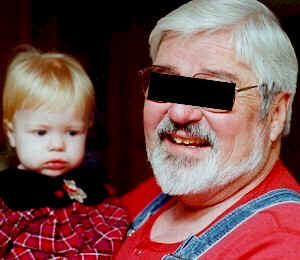
Come read the article about Joe M., A MATTER OF LIFE OR DEATH. A true story about living life while facing death Joe died in August 2002. |







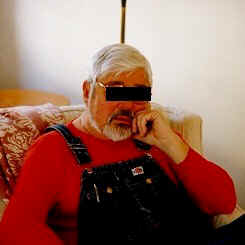 Al. Why did you retire?
Al. Why did you retire?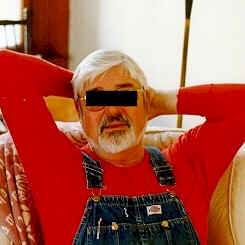 But I did change. I started going to
Alcoholics Anonymous. However, the withdraws were hellish for the
next week. I went to a meeting then to mass and came home. No one
was there. I knew that there was only way that I could get
through the withdraws. I went downstairs to the basement and got
a couple of beers out the refrigerator. I sat on my basement
steps and cried. I knew what I had become at that moment-I
was a helpless drunk. I cried out, "God, help me. I
don't know what I'm going to do." After I cried out to
God, it was like a weight was lifted off my shoulders, and I have
not had a drink since.
But I did change. I started going to
Alcoholics Anonymous. However, the withdraws were hellish for the
next week. I went to a meeting then to mass and came home. No one
was there. I knew that there was only way that I could get
through the withdraws. I went downstairs to the basement and got
a couple of beers out the refrigerator. I sat on my basement
steps and cried. I knew what I had become at that moment-I
was a helpless drunk. I cried out, "God, help me. I
don't know what I'm going to do." After I cried out to
God, it was like a weight was lifted off my shoulders, and I have
not had a drink since. 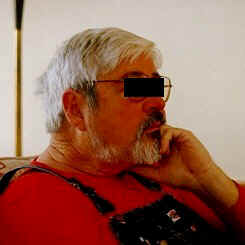 Al. I want to ask you about the relationship
between hard times and success.
Al. I want to ask you about the relationship
between hard times and success.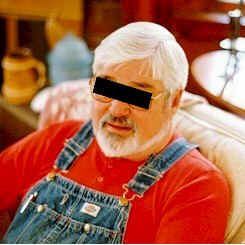 Al. It is strange how misfortunes often turn into blessings.
Al. It is strange how misfortunes often turn into blessings.